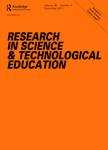版权所有:内蒙古大学图书馆 技术提供:维普资讯• 智图
内蒙古自治区呼和浩特市赛罕区大学西街235号 邮编: 010021

作者机构:Department of Special Education National Taipei University of Education Taipei Taiwan Department of Technology Application and Human Resource Development National Taiwan Normal University Taipei Taiwan Department of Instructional Systems Technology Indiana University Bloomington Bloomington IN United States
出 版 物:《Research in Science and Technological Education》 (Res. Sci. Technol. Educ.)
年 卷 期:2023年第43卷第1期
页 面:86-106页
学科分类:0402[教育学-心理学(可授教育学、理学学位)] 0401[教育学-教育学] 04[教育学]
基 金:Ministry of Science and Technology Taiwan MOST (MOST 107-2511-H-003 -036 -MY2)
主 题:Attitudes toward STEM expectancy-value model instrument development integrative STEM learning
摘 要:The purpose of this study was to develop and validate an instrument to measure attitudes of middle school students toward STEM learning, including integrative STEM learning. The participants were 274 middle school students (grades 7–9) in Taiwan. Results from the expert review, exploratory factor analysis, correlational analysis, and group difference analysis provided different sources of validity evidence. Five factors were identified, including students’ interest/expectancies in math, perceptions of importance/utility of math, attitudes toward science, attitudes toward technology/engineering, and attitudes toward integrative STEM learning. Moderate correlations among the factors and STEM career interests and statistically significant group differences in terms of gender and participation in math remedial instruction were found. Multiple regression analysis results also showed that the five factors statistically significantly predicted STEM career interests. Internal consistency indicated an appropriate to excellent level. These results provided preliminary support for the psychometric properties to measure middle school students’ attitudes toward STEM learning. Finally, this study points out the critical role of integrative STEM learning in the construct and suggests further research on the mechanisms among expectancies for success, subjective task value, and persistence in learning STEM. © 2023 Informa UK Limited, trading as Taylor & Francis Group.